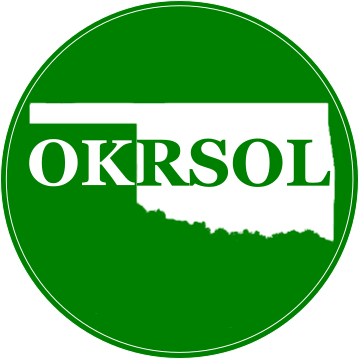Posts

Registering in the Coronavirus Pandemic
April 9, 2020
During this unprecedented and difficult time, we are all looking for the right answers and guidance to safely navigate through this COVID-19 pandemic in order to keep our families and ourselves healthy and safe. Physically distancing from others has become increasingly necessary to lower the likelihood of further transmission, and only for the absolute necessity of survival and medical care/virus testing should we travel outside the home. However, there are still some requirements left unaltered putting Oklahoma citizens and their families at more risk than others, in-person registration.
Those individuals, who are required to register with their local law enforcement per the Oklahoma Sex Offender Registration Act (OSORA), are still bound by the law to show up in person to renew their registration regardless of the risk of infection to the registrant, the law enforcement personnel processing their letters, and the families of both. In New York, which has the highest number of infected, registration requirements, deemed non-essential, have been postponed during this crisis. Both Pennsylvania and Oregon have prohibited in-person verification. Most recently, Judge Cleland in Michigan has taken it further, ruling that all law enforcement must immediately stop enforcing registration, verification, school zone violations, and fee violations until the COVID-19 crisis has ended including a mandate for the notification of his decision to trickle down to all levels of law enforcement and district attorneys. There are some counties in other states that have suspended such requirements, but in most states, including Oklahoma, there has been no state-wide mandate to halt the requirement during this pandemic.
On March 30th, NARSOL, the National Association for Rational Sexual Offense Laws, issued a press release demanding that all law enforcement immediately cease all in-person requirements of registrants and stop putting millions of families at risk of exposure to coronavirus. Read the NARSOL COVID-19 press release HERE.
OKRSOL has communicated with the Governor of Oklahoma, the speaker of the House, and the President Pro Tempore of the Senate to emphasize the need to suspend in-person verifications. When we submitted our statement with the Governor’s office from the standpoint of healthcare, we received a generic response explaining what an amazing job Governor Stitt was doing in response to the coronavirus. We then submitted the same statement again but addressed it as criminal justice but have received nothing. Both submissions to the Governor included the following attachment from the Sex Offense Litigation and Policy Resource Center:
To contact Governor Stitt with your thoughts on this issue, go to:
The Oklahoma Department of Corrections issued the following statement concerning COVID-19 and registration:
“Thank you for contacting our office regarding the protocols in place during the COVID-19 pandemic situation. Our office maintains business as usual as Sex and Violent Offender Registration is determined as essential in the Oklahoma Department of Corrections. We, too, received telephone calls inquiring of changes to the current registration and verification procedures for offenders residing in Oklahoma; however, as DOC is statutorily mandated to follow the law, we cannot waiver without specific law to alter or waive. Law enforcement agencies are determining what is best for their agency and our office cannot dictate their protocols.”
OKRSOL recently learned that the Oklahoma City registration office is not requiring registrants to report in person at this time. Their office is asking registrants to fill out their letter, make a copy, and send it by email with a copy of the registrant’s current identification (drivers licenses/state issued ID). If you have any questions about the suspension of in-person address verification, call the Oklahoma City registration office at 405-297-1197.
We cannot emphasize enough that the law has not changed. Every registrant is still required to show up in-person with their letter for verification at their local law enforcement office. If the Governor were to issue a statewide mandate to suspend, a judge rule on the issue like in Michigan, or the Oklahoma legislature took up the issue and vote to suspend the in-person requirement, that would legally change the requirement until the COVID-19 pandemic was over, but that has not happened. We suggest that all registrants contact their local law enforcement office with their questions regarding registration at this time. Always document every contact made with your registration office. Take notes of the date and time of the call and the name of the person you speak with. If you can record the call, that’s even better. If your office is implementing a change and requests that you not show up in person, ask for that in writing and sent to you by email or postal mail. Every precaution needs to be taken during this time in order to legally protect yourself. These types of precautions should always be taken when registering but even more so now if your registration office is offering an alternative way to register, one that does not follow the legal requirement.
Do everything you can to protect yourself legally if asked not to show up and physically if you must get out and to your registration office. Be safe and wear any protective gear you may have especially masks and gloves or a makeshift face covering using what you have. Bring your own pen and do not use theirs, and most importantly, wash your hands when you return home. During this pandemic, we understand there’s fear and anxiety when you must leave home and go register, but we also understand there’s fear and anxiety if you do not. Take every precaution necessary and take care of yourselves and your families. Our hearts, our thoughts, and our prayers are with you. Contact us at OKRSOL if you have any questions, concerns, or just need some support. We face this difficult time together even though being apart is how we remain safe.

Failed policy, no privacy and real danger
December 6, 2019
By Ben...
In today's day and age of technology, people are finding more creative ways to make money. The internet, access to advanced software, and the lack of privacy increases those opportunities, and when traditional, legitimate means to generate money fail, some will turn to a more sinister way to increase their income. It’s common knowledge that there is a new type of criminal out there, the intelligent, tech savvy, computer code whisperer looking for any way to exploit security software and obtain access to sensitive personal data. Identity theft, data breaches, robo calls, scam callers, they're all a part of the new reality of the times we live in, and there's no end to the lengths they're willing to go.
For one class of people, these threats go much further, beyond what most must fear, those that have been convicted of a sexual offense and find themselves on a public registry. In this era of online security threats and tech-enabled criminal activity, one's personal information has become of such value that the need to safeguard it has become an industry. However, the opposite can be said for those on a public registry. Their personal information has become a target, more exploitable than any other US citizen's. It’s public, free, and a ready-made trove for the criminally minded extortionist looking to make money off the backs of those already marginalized and struggling. This information has no online protection or firewall safeguards. In fact, even though the public registry does little to protect the public, more information is being added without regard to the negative effects it may have.
Registered citizens already have much on their plates, and now there is a wave of scam calls with criminals impersonating law enforcement officers. These people demand money over the phone or face arrest. These fear tactics have become widespread, spanning many states and have real law enforcement officials baffled. Their own registration offices have seen their phone numbers spoofed, used by scam callers while imitating officers from their department. Law enforcement Facebook pages are being trolled to know who to impersonate. All information online about a registrant and where they register is being used in full detail in order to make these calls believable.
Now there’s a new threat. It comes in the form of a printed and mailed extortion letter. The sender threatens an information campaign against a registrant if they do not pay hundreds of dollars each month. They claim they will make everyone possible, within the community they live and anyone their family associates with, aware of the crimes that placed them on the registry. They hide behind technology; demanding payment by bitcoin to protect their identity. These self-proclaimed extortionists, like the scam callers, utilize the public registry to track and determine every victim.
All these criminals are utilizing different forms of technology to seek, research, hide, or demand payment. Some have even been so bold as to knock on the door of a registrant’s home to extort money. These threats are possible because registries are public, the same registries that have been found to be ineffective. This doesn’t just affect the registrant. The family including innocent children are within the cross-hairs of these targeted crimes. Payments made to the extortionist will cause financial hardship. If not, their children face ridicule and bullying in school, and their spouses experience discrimination. It is a lose-lose scenario for a registrant’s family but win-win for an extortionist. They either make money or ruin lives out of hate. Besides threats of vandalism and murder, now extortion will follow them no matter where they live, work, or go to school. These are all constant concerns for someone on the registry because their privacy isn’t protected like everyone else’s. It’s blatantly exploited at the hands of criminals committing acts of hate for personal gain.
Registrants already must navigate through an array of laws and restrictions for the sake of policy that has failed, a registration scheme that has become nothing more than further punishment, banishment, and a scarlet letter of shame. Now they face being targeted more and more, without the same protections awarded other citizens. When did it become socially acceptable that anyone in our country has less right to safeguard their families from personal, physical, and financial attack? When will the privacy of ALL effectively become more important than the failed experiment of sexual offense-based registries? When these lists become more productive as a target for ridicule, hate, harm, and extortion, their failed purpose does not justify their proven punishment. The targets placed on entire families are not an unintended consequence, they are the only result.
